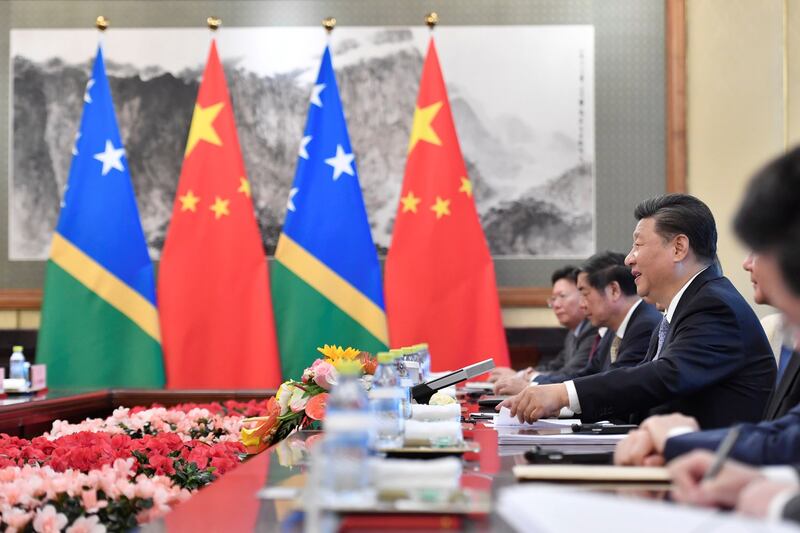The Solomon Islands and China are considering a security pact allowing Beijing to set up military bases and deploy troops in the Pacific island nation. The reported move drew immediate concern Thursday from close U.S. ally Australia.
Honiara has signed a policing deal with China and "will send a proposal for a broader security agreement covering the military to its cabinet for consideration," a Solomon Islands government official was quoted by Reuters news agency as saying Thursday.
A leaked draft security cooperation agreement circulated on social media and later confirmed by Australian media as authentic says "China may, according to its own needs and with the consent of Solomon Islands, make ship visits to, carry out logistical replenishment in, and have stopover and transition in Solomon Islands."
This suggests there would be Chinese logistical hubs or bases in the island nation, which occupies a remote but strategic location in the western Pacific, about 1,700 kilometers (1,050 miles) from the northeastern coast of Australia.
The draft also says “relevant forces of China can be used to protect the safety of Chinese personnel and major projects in Solomon Islands,” referring to the deployment of Chinese troops.
This security agreement, if approved, would be eyed with concern by the United States, which has been making efforts to reconnect with the Pacific and to counter China’s rising influence in the region.
Analysts say a presence of Chinese troops in the Solomon Islands could raise the risk of confrontation between China and the U.S. and its allies, as well as challenge the U.S.-led vision of a “Free and Open Indo-Pacific.”
Australia, which is a U.S. treaty ally and has its own concerns about China’s rising military clout, was quick to express its misgivings about the planned agreement.
"That is our backyard, this is our neighbourhood and we are very concerned of any activity that is taking place in the Pacific Islands," Australian Home Affairs Minister Karen Andrews was quoted as saying by ABC.
Malcolm Davis, a senior analyst at the Australian Strategic Policy Institute (ASPI) think tank, said: “This is a very serious development in Australia's defense and national security - the very real prospect of a Chinese military presence close to Australia.”
If approved by the Solomon Islands cabinet it would also be the first time the Chinese military has an operational presence in the Pacific region.

‘Grim prospect’
“This is pretty grim,” said John Blaxland, professor of International Security and Intelligence Studies at the Australian National University.
“I presume the Australian government is formulating a response,” he added.
U.S. Secretary of State Antony Blinken in February made a week-long trip to the Indo-Pacific in an effort to elevate American engagement with the remote Pacific islands – described by one analyst as “ground zero” for U.S.-China strategic competition.
During the trip, the U.S. top diplomat said his country was looking to reopen an embassy in the Solomon Islands to reaffirm the U.S. strategic interest in the region.
Washington closed its embassy in Honiara in 1993.
President Joe Biden's Indo-Pacific Coordinator Kurt Campbell said in January that the United States has “enormous moral, strategic, historical interests” in the Pacific but had not done enough to assist the region.
In recent years, China has been actively developing closer ties with the Pacific islands, wooing them with infrastructure loans and economic assistance, as well as military exchanges.
The Solomon Islands switched diplomatic recognition from Taiwan to Beijing in 2019 – a move to please Beijing, which seeks to diminish the international diplomatic recognition of the government in Taiwan.
“The Pacific Islands have of late become a ‘ground zero’ for the strategic competition between China on one side and the U.S., Australia, and to a lesser extent, Japan, on the other,” said Alexander Vuving, a professor at the Asia-Pacific Center for Security Studies, a U.S. Department of Defense institute based in Hawaii.
